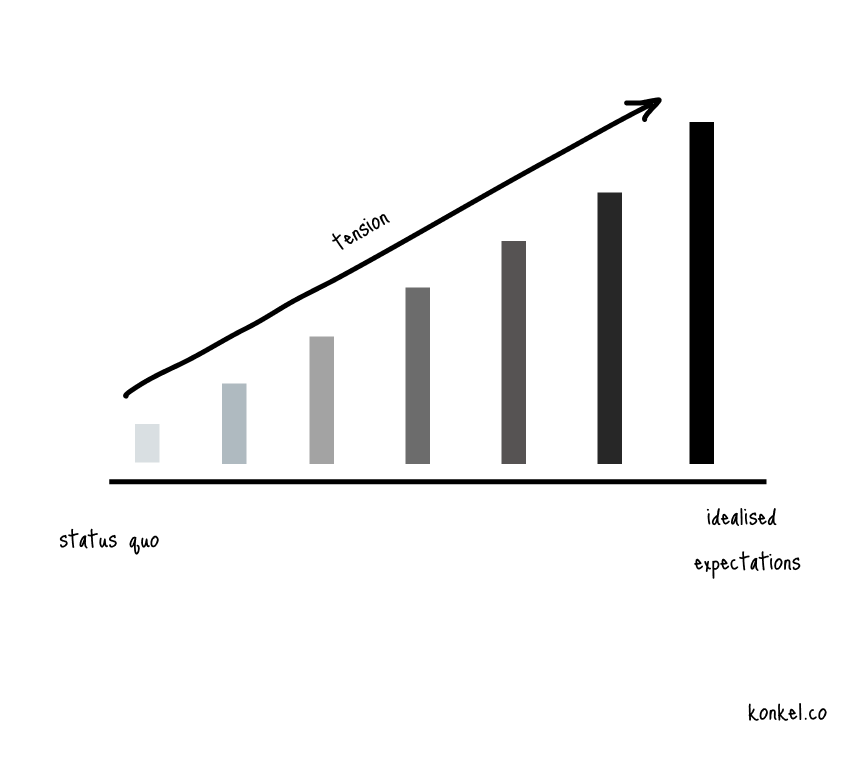🫡What does it mean to respect your place of work and how Indonesia 🇮🇩 can teach you that.
(subscriber only)
ughout the years, I’ve met some Scrum Masters and Agile Coaches who imposed their idealistic visions of teal organisations1 on the companies they were working at. I’ve also been guilty of this at the beginning of my career.
Through the years, I’ve learned to respect the places I serve, which has helped me a ton in doing meaningful work.
Living in Indonesia 🇮🇩 for four months now (seven in total2 through last 1,5 years) here’s what I noticed about respect and how it translates to working with companies.
🫰🏼 What respect is in this context?
“The feeling you show when you accept that different customs or cultures are different from your own and behave towards them in a way that would not cause offence”
🇮🇩 How does Indonesia fit in?
Let’s take Bali🏝️ as an example. People come here from all over the world3. Many tourists complain about crazy traffic, trash, misunderstandings when speaking English etc.
They don’t see and respect what shaped such an environment and what causes people to behave the way they do.
Moreover, many Westerners feel privileged to judge and point fingers coming from wealthy and developed countries, bringing their local standards (of which some are flawed).
Let’s take the “crazy traffic”, 🛵 which is viewed as dangerous and downright terrible. Having made thousands of kilometres here, I can say that locals are much more thoughtful and diligent. People in Europe tend to blindly follow the rules whereas locals are not only kinder (no road rage) but also adjust to conditions making the traffic flow, helping each other out (Grab & Gojek4 drivers have my highest regard here) and can transport everything5.
🏢 So what about respecting your place of work?
Some Scrum Masters and Agile Coaches (relates to any role, really) come and do the same as Westerners in Indonesia.
They bring their idealised view of how things should look and expect others to uphold the same standards. Not only might those standards not be the right way to go but they also can create unnecessary tension.

Same as when visiting Bali in Indonesia. When you tell local people how they should live, but you didn’t go through the same life in the same circumstances, you are just being rude and disrespectful.
I’m not saying that showing new perspectives is bad. Quite the opposite, it’s necessary. I’m talking about respecting people where they are, which does not mean behaving like them.
Do the hard work with them, not to them.
All companies developed due to some forces and decisions from the inside and outside. Criticising without understanding shows only how large the person's ego is rather than supporting the other side and their business.
👤 Bhinneka Tunggal Ika
Indonesia has over 275 milion people, 1300 ethnic groups and over 700 languages (the official being Indonesian).6 That is why one of the Indonesian values is “Different in Unity” (id. Bhinneka Tunggal Ika).
I see the same applying to working as a change agent. You work with different people backgrounds who may speak other languages:
metaphorically - different understanding of what’s behind certain words
directly - English not being their native language
One does not have to agree and accept everything about how things are done, but, despite differences, know we are all in this together.
If a Scrum Master or an Agile Coach cannot do that, they should quit and look for a place more aligned with their values. I did that myself. I see this as a sign of taking ownership and bravery rather than failure.
🙌 How to be respectful and do the work
All of the above is not about abandoning your ideals. It’s knowing that things take time and maybe some of them will never be achieved.
Here are four things helping in being respectful and doing the work.
☝🏼Know your non-negotiables - knowing what things you cannot live without in a workplace (I don’t mean free lunch) is vital. It prevents burnout and tension. It helps you make a better decision when interviewing companies.
⚗️Do small experiments - progress isn’t made overnight; make small nudges to change the course, keeping it on the verge of people’s comfort zone. Taking it too far will only cause stress.
🪞Show a mirror - naming and visualising things has a lot of magic. It dresses up the things people felt or saw, but due to the daily grind, missed.
📊 Show progress - you will rock the boat when you do the above. So when the organisation makes progress - show it. People overlook the journey they made over a more extended period (weeks, months). Showing it will put them more in control of how they work and may lead to increased ownership.
How do you work through the odds to make progress, stay congruent to yourself and respectful to others?
—
🎈Share this post if you think it can help others to be more mindful leading change.
Read why teal is not the answer here → https://medium.com/agile-change/the-main-threats-of-turquoise-teal-organizations-2d46d83b1aae
I feel that through this time I got to know maybe 10-15% of the culture with it’s shades. That even though I read a lot and learned a bit of Indonesian.
source: The Central Bureau of Statistics (BPS) via https://balimanagement.villas/blogs/bali-tourism-statistic/
Asian versions of Uber and Uber Eats.
https://www.marcinkonkel.com/journal/happiness
https://www.instagram.com/reel/ClP-AarJksg/?igshid=YmMyMTA2M2Y=
(ok this one☝🏼 is a bit too much)


